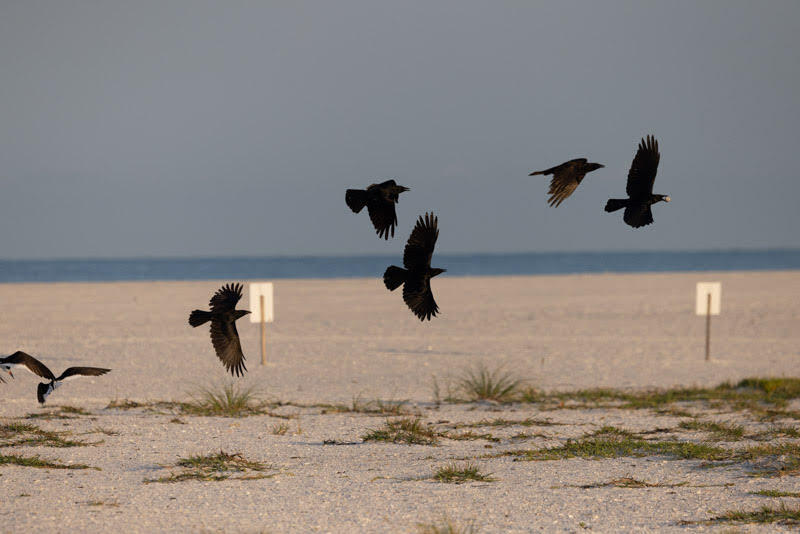South Lido Beach Park on the Gulf has become a battleground for the survival of the state-threatened Least Tern: seabirds vs crows.
The Least Tern colony that calls this beach home is vital for the species' overall population health. Each egg and chick represents a step toward ensuring the continued existence of Florida’s smallest tern species. Earlier this year, however, it became abundantly clear this colony had a problem: The nearby park was sustaining a large family group of Fish Crows. Within 24 hours of the Least Terns laying eggs, crows devoured them, posing a significant threat to these imperiled beach-nesting birds. The predation became so intense that the colony completely abandoned the site and returned a month later.
Crows are highly intelligent and opportunistic birds, quickly adapting to new food sources. Unfortunately, human activity is one of the primary reasons for the increased crow presence. The abundance of trash and food scraps left behind by visitors to the nearby park created an environment where crows thrive. This careless behavior attracts crows in large numbers; once in the area, they discovered the Least Tern eggs.
To combat this threat, we implemented a series of protective measures:
- Perch Deterrents: These can prevent crows from using nearby vantage points to scope out chicks or eggs. They can easily be installed on the tops of nearby structures like beach signs, posts, and shelters (with permission from the property owner) as well as chick shelters, themselves.
- Increased Human Presence: Trained volunteers and staff increased their presence at the nesting sites to monitor and deter crows. Regular patrols were conducted to keep crows at bay while not disturbing the growing Least Tern colony.
- Continued Trash Management and Community Involvement: Educating the local community about the plight of the Least Terns and the importance of keeping the park clean has been crucial. Informative signs are present at the park to raise awareness about the impacts of littering, encouraging visitors to dispose of their trash properly and reduce the food sources that attract crows.

What Can You Do?
Visitors to South Lido Beach Park must take responsibility for their actions. Every piece of trash left behind can attract crows and other predators, putting the Least Terns at risk.
Thanks to the dedicated efforts of volunteers, staff, and the local community, there is hope for successful nesting seasons despite the challenges posed by crow predation. This year, after management strategies were implemented, the colony successfully fledged nearly 170 chicks!
- Do Not Feed Local Wildlife: This includes gulls on the beach, crows in the park, and all other wildlife in the area. Feeding wildlife will only attract them in larger numbers, leading to increased conflicts, disrupting their natural behaviors, and potentially endangering vulnerable species like nesting sea and shorebirds.
-
Pack Out Your Trash: Always take your trash with you when you leave the beach. This simple act can significantly reduce the attraction of crows to the area.
-
Properly Dispose of Food Scraps: Do not leave food scraps behind on the beach or in the park. Use designated trash bins and ensure they are securely closed so predatory and opportunistic birds do not learn to associate humans with food.
-
Spread Awareness: Inform others about the importance of keeping the beach and surrounding areas clean to protect our vulnerable wildlife.





